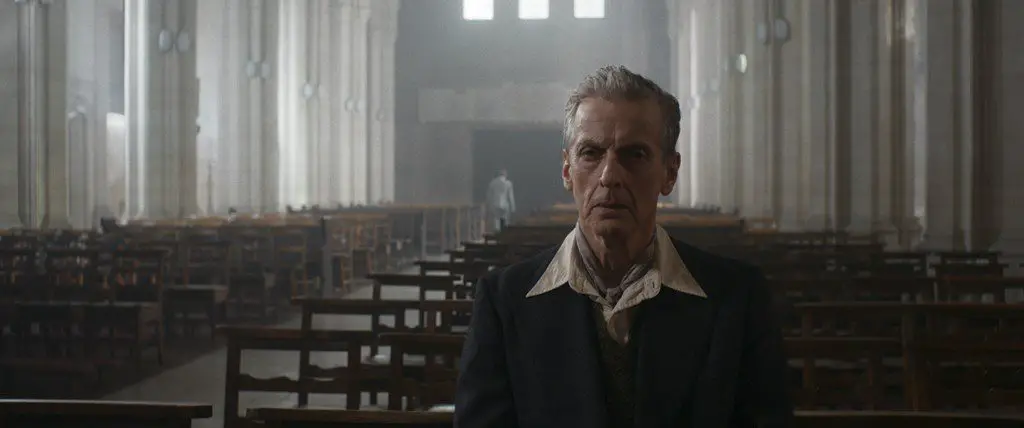Few filmmakers make quite as consistent or distinctive a style of films as Liverpudlian director Terence Davies. Throughout much of his career his works have been strongly autobiographical, with films like Distant Voices Still Lives, The Long Day Closes, and Of Time and the City telling vignetted stories of ordinary working class families living and growing up as he did in the tenements of Liverpool after the war. Increasingly though, his oeuvre has grown beyond the slums of that Northeastern city and taken on increasingly large canvases. Though less idiosyncratic, these films like Sunset Song, The Deep Blue Sea, and in my opinion his masterpiece A Quiet Passion have given him scope to explore new territory and bring his unique perspective and aesthetic to bear on weightier narratives.
Like A Quiet Passion, his latest film Benediction is a biographical drama of a celebrated poet, in this case, one of the most widely acclaimed World War One poets, Siegfried Sassoon, here played as a young man by a devastatingly handsome and intellectual Jack Lowden and then as a cantankerous regret-filled grump by Peter Capaldi, who delivers his lines in an accent like a peeling wrought-iron fence. Sassoon’s story seems almost tailor made for Davies’ artistic sensibilities, providing ready access to his favourite themes of nostalgia, poetry, longing, regret, and the Catholic guilt of a gay man living with “the sin that dare not speak it’s name”. Much of the film is devoted to exploring and celebrating the gay subculture doing its best to flourish under the heel of the Labouchere Amendment, following Sassoon’s relationships with different men over many years, including music-hall star Ivor Novello, played as an exquisitely diva by Jeremy Irvine at his cheekboniest, spitting his every line out like a cherry stone.
Like Of Time and the City before it, the film begins with a curtain rising—Davies loves his theatre, his secular pageantry—and we begin to hear the first of many recitations of one of Sassoon’s works (and of Wilfred Owen’s in the film’s devastating final minutes), read by Lowden with a sonorous, determined earnestness. Also returning from Of Time and the City is Davies’ use of documentary footage, beginning with young men lined up at recruitment offices to sell their lives away for a shilling and a lie, as do Sassoon and his little brother. Sassoon’s perspective on the war was candid and angry, his experiences of the war quickly dispelling any notions of the nobility of British imperialism, and depicting his PTSD gives Davies opportunity for some of the best transitions of his career: so subtle yet so affecting.
Davies understands and embraces poetry like few filmmakers. With all his films what lingers are not so much characters, set pieces or plot developments, but the juxtaposition of images, the fading from one moment to another and the dramatic punctum of a line of speech, delivered with decisive fervour. In a key early scene, Sassoon claims never to act on impulse, and perhaps this is one of many places where Davies sees himself in his subject. At all times he conducts his films with a reserved surety and intentionality. He may very well be the most deliberate filmmaker of all.

This can sometimes be mistaken for slowness, but Benediction may well be his most watchable, accessible and entertaining film yet. This is thanks in large part to the uncomplicated joy of fantastic actors relishing the brilliant dialogue they’ve been gifted. The script is loaded with one dazzling gem after another, I could make this whole review a countdown of the top twenty best lines in his script and still have to make some very difficult cuts. I laughed out loud more at this than almost any other movie this year (the exception is Turning Red). The colourful characters populating the film are such a joy to listen to and hear verbally spar, whether it’s the pithy retorts of society’s waspish confirmed bachelors, or the exacting and incomparably wholesome heart to hearts between Sassoon and his paternal doctor (Ben Daniels) with whom he shares the sweetest and funniest coming out scenes put to film since Pride. Some might tire of the acute sharpness of the dialogue, and some might argue that’s intentional, but I for one never did. I soaked up Davies’s wit like a sponge.
It would be an unfathomable error to mischaracterise Benediction as a light comedy though. It’s as intense and capital-R romantic as any of Davies’s works. Sassoon is characterised as a lost soul, grappling with his remaining years. The film’s enrapturing first half hour (which ranks among the best cinema this decade has yet brought us) establishes his joys and his passions, including his tender regard for a young Wilfred Owen (Matthew Tennyson), which we then see slowly fade from his sight, until by the time Capaldi takes over the character, he’s all hollowed out, left to age in jaded misery, angry and withdrawn, unable to forgive or to forget the past. Deprived of the one person with whom he felt he could be truly himself, he spends the rest of his days looking for someone to give him an identity, spring-boarding from one bad relationship into the next.
The performances are to the last magnificent, especially from Lowden who is a revelation as Siegfried, who is never less than an effortlessly engaging lead: prickly and guarded, yet bursting with intelligence and sincerity looking for an outlet. Capaldi, meanwhile, has been given an even taller task, with the malcontent older Sassoon a decidedly difficult personality to warm to, but Capaldi’s charisma is enough support for these scenes, even without the tactful empathy of Davies’s camera. His deliberate, occasionally stilted style gives a hyper-real quality to whatever material he touches that is intensely poetic in affect.
Like any of Davies’s films, Benediction might feel a little less than the sum of its individually exquisite parts, assembling a collage of Sassoon’s life more than a portrait of it, but it’s still an exhilarating, tragic, and magnetic triumph that only Davies could have ever made, in which every moment is laden with beauty and subtext of an almost unbearable richness.



